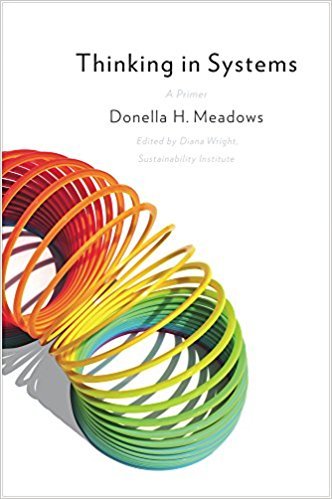Book Review: "Thinking in Systems: A Primer" by Donella H. Meadows

This book is pretty self-explanatory. It's about systems, they ways they can surprise us, and the proper way to think about them so they can work in our favour. Everything with an input and an output can be thought of as a system. Some systems are simpler than others. The main terms used in the analysis of systems are "sinks", "flows", and feedback loops.
Sinks are units in a system that hold a resource. For instance, when the system examined is the water cycle, both lakes and underground water tables are sinks. When managing a inventory for a store, the amount of storage space constitutes a sink. When planning your inventory to accommodate fluctuation in the daily order volume for a store, the size of your storage space is an important factor. When planning in case the river adjacent to your house may flood, the size of the lake feeding it is an important consideration.
The next big constituent are flows. These constitute the movement of energy or resources between sinks, as well as into and out of the system. While a lake is a sink, a river is a flow. While your warehouse is a sink, both the deliveries from your supplier and the orders from your customers are flows. To properly understand a system, taking stock of both its sinks and flows will give understanding of whats in it, as well as some predictability. To understand the system in its full capacity, one also needs to see the flow of information: what feedback loops affect it?
It is the capacity for feedback loops that enable some systems to remain very stable and return to balance when disturbed (these are called balancing feedback loops), whereas some feedback loops amplify the effect of the system, enabling it to run at an increasing exponential strength until the limits of the surrounding system collapse. An example of a balancing feedback loop would be in a thermostat, where the further the temperature deviates from desired, the harder the heater or AC unit works to bring it back. An example of a reinforcing feedback loop is population growth: when the standard balancing feedback loops (usually predation) are removed, the increased population of a species of animals allows that generation to have even more offspring. The more animals there are, the more there are the next generation, until the reserves of food disappear and the population collapses.
I found the book to be an interesting primer, but a bit more on the common-sense for me. It may be that my knowledge of economics and my time spent as a programmer has given me more-than-average practice in designing, troubleshooting, adjusting and understanding systems, so this book was not as useful for me as it could be for another. Also, I found her examples of feedback loops dealing with economics, such as the much feared feedback loop of capital accumulation and her explanation of the business cycle to be lackluster. For a thorough text on economics (useful for seeing the application of systems to a grand scale), I would recommend the works of Murray Rothbard.
Congratulations @eldritchrites! You have completed some achievement on Steemit and have been rewarded with new badge(s) :
Click on any badge to view your own Board of Honor on SteemitBoard.
For more information about SteemitBoard, click here
If you no longer want to receive notifications, reply to this comment with the word
STOPCongratulations @eldritchrites! You have completed some achievement on Steemit and have been rewarded with new badge(s) :
Click on any badge to view your own Board of Honor on SteemitBoard.
For more information about SteemitBoard, click here
If you no longer want to receive notifications, reply to this comment with the word
STOP